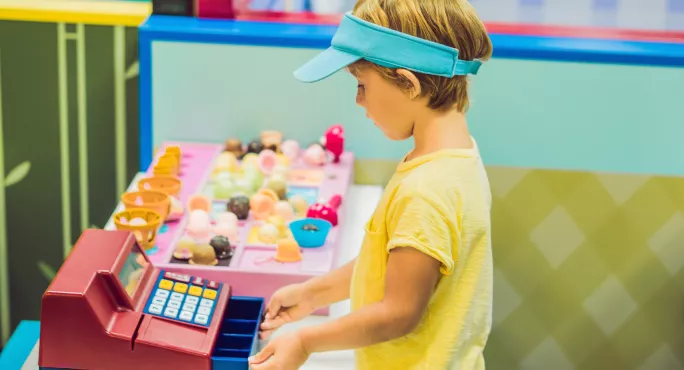
- Home
- Why role play is crucial to early maths
Why role play is crucial to early maths

âI began to conclude that childrenâs role play was concerned with the larger themes of life, like love and power, rather than mundane things like the price of potatoes.âÌı(Gifford, 2005)
The aboveÌıquote appears at the top ofÌıDr Helen Williamsâ PhD thesis on role play in mathematics, and I was immediately intrigued.
Engagement: âTeachers, never underestimate the power of having funâ
Pedagogy:Ìı5 responses to scepticism about play in the early years
Mathematics:ÌıPE lessons and 5 other ways to boost early maths skills
The âGiffordâÌıin question isÌıDrÌıSueÌıGifford whoÌıwas WilliamsâÌıPhD supervisor, and challenged Williams to prove her wrong. Instead, her eventual findings were largely consistent with her supervisorâs ideas, with some important provisos.
Clipboards and dinosaursâIâve learned that small children donât really care about the price of potatoes,âÌısays Williams, a maths expert who works in schools across the UK. âBut they do care about whoâs opening the shop, whoâs operating the till and whoâs taking the money.ÌıThey also love stocktaking; clipboards are good.âÌı
Are clipboards materially different from potatoes, in this respect, I wondered - arenât they still âmundaneâ?
Not according to Williams, whoÌı- in an episode peppered with academic references - presents a serious theory of mathematical learning and power at odds with the sort of conversation about children playing shop I was first anticipating.
âLearning canât be considered separately from roles and relationships in the classroom,â she explains. âItâs all about power and control.â
The clipboard and the money, of course, can be considered powerful symbols of both.
AndÌımaybe they are just fun to handle, too. WilliamsâÌıwork is so grounded in practice - which in her case means spending hours on classroom floors with the messy multiple realities of young children - that she has a remarkable ability to blend the academic with the pragmatic, the serious with the comic.
This is important, as we areÌıtalking about the very real and authentic problems in mathematics and pupil engagement, a subject that has been considered in the research for some time.
âMaths has been out of a limb in terms of being in touch with what children are really into,â she says.
I look at the example problem from her research article and I can barely get through the next sentence without giggling: âHow can dinosaurs order food at a café if they canât speak?â
Iâm immediately entranced by this problem, and can see why it might be fun - but is this really how we canÌıteach maths?
Maths +Ìıplay = fun and learningAbsolutely, Williams says. Far from âcome and do your work, and then youâve finished and now you can go and play - unmonitored and unobservedâ, the worlds of workÌıand playÌıcan become more intimately and excitingly intertwined through mathematical role play. Not mathsÌıthenÌıplay any more but mathsÌıandÌıplay.
This is becauseÌıenjoyment is really, really important to learning, she says.
âIf, as a teacher, I operate under an ethic of caring, then I have to accept and receive childrenâs feelings about the subject as part of teaching it. So, if I achieve my ends instructionally, but children hate the subject, then Iâve failed.â
Williams is deeply saddened by the experience of people still telling herÌıâI hated maths becauseâ¦âÌı
âThere is so much evidence of people feeling divorced from maths and we are in danger of continuing to recreate that in the classroom with very transmissive teaching,â she observes.
But teachers can change this: âThoughtful teachers able to make a contagious identity of us being mathematicians, which is very powerful.â
This leads us on to a discussion aboutÌıthe power of role play to enable us to make mistakes as someone else, and the way this might relate to an identity ofÌıbeing a mathematician. âI often ask pupils to come to the front and pretend they are the teacher,âÌıshe says.
âRole play is not just about sillinessÌıor propsÌıor costumes; itâs about the intention to create a common, shared experience to build our maths around.âÌı
Listen to the episode to hear more: about drama teacher and maths teacher âliaisonsâ; determined pupils putting on their life jackets and setting sail; worksheets and time wasting; megagames; unpredictable cocktails; being a âmathematician in residenceâ; and me patiently explaining the plot of the film Kindergarten Cop to Williams, who had *gasp* never seen it (Iâm sure thereâs a reason why it came up).Ìı
Lucy Rycroft-Smith works in communications and research for Cambridge Mathematics and is the presenter of the Tes Maths podcast. She tweetsÌı
ReferencesÌı
Lucy mentions:
1.Ìı
2. The articleÌı
3.Ìı
4.Ìı
5.Ìı
6.Ìı
Ìı
Helen mentions:
1.Ìı
2.ÌıÌıwork includingÌıA Childâs Work/Wallyâs Stories
3.Ìı
4.Ìı
5.ÌıÌıthat identities are situated, layered, cumulative and forever changing
6.Ìı
7. Garveyâs bookÌıÌı
8.Ìı
9.Ìı
10.Ìı
11.Ìı
12.Ìı
13.Ìı
14.Ìı
15.Ìı
Ìı
Want to keep reading for free?
Register with Tes and you can read five free articles every month, plus you'll have access to our range of award-winning newsletters.
Register with Tes and you can read five free articles every month, plus you'll have access to our range of award-winning newsletters.
Keep reading for just £4.90 per month
You've reached your limit of free articles this month. Subscribe for £4.90 per month for three months and get:
- Unlimited access to all Tes magazine content
- Exclusive subscriber-only stories
- Award-winning email newsletters
You've reached your limit of free articles this month. Subscribe for £4.90 per month for three months and get:
- Unlimited access to all Tes magazine content
- Exclusive subscriber-only stories
- Award-winning email newsletters



